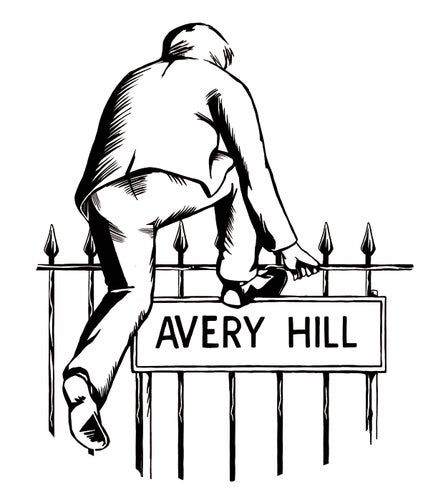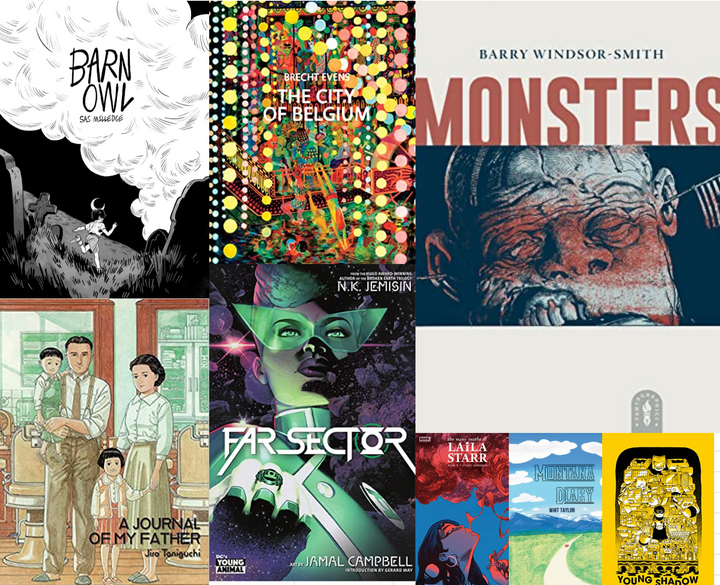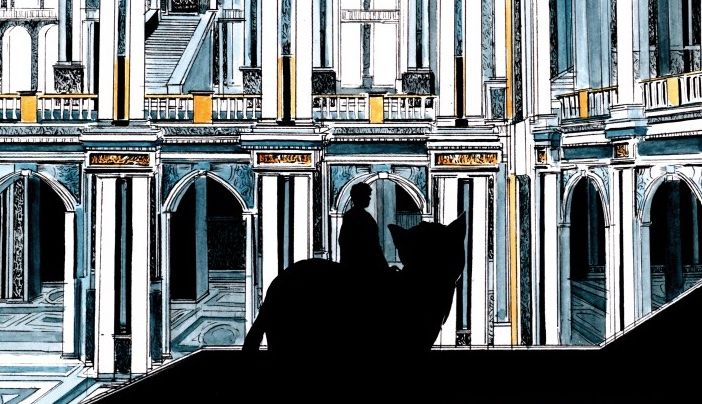Ricky Miller Talks the Avery Hill Kickstarter
Avery Hill has launched its first Kickstarter, and Ricky and I had the chance to chat about what that means for the company, what the spring releases offer new readers, and the role of Avery Hill as a publisher.

Avery Hill has launched its first Kickstarter, and publisher Ricky Miller and I had the chance to chat about what that means for the company, what the spring releases offer new readers, and the role of Avery Hill as a publisher.
At this point, there are nine days left and campaign needs another $6000 (I have no idea what that is in pounds). I'm pretty sure 9 days is the same on both sides of the Atlantic. Wait, that's not what a fortnight is, is it?

Mike: Hi Ricky, and thank you for agreeing to talk a little about the Avery Hill Spring 2022 release Kickstarter. I think the best question to start off with is the most obvious one. This is Avery Hill’s first Kickstarter. What prompted you to utilize a crowdfunding campaign?
Ricky: It had always been something in the back of our minds as a possibility. We saw other publishers using it to good effect and decided now might be the right time. When we announced it we listed the following 5 reasons:
1. Find a new audience direct from Kickstarter.
2. Get money for the creators quicker than the usual retail distribution model which takes months to come through.
3. Financial (we used to pre-fund the print costs from personal funds and that's becoming more difficult).
4. Shake things up.
5. "It's worth a go."
Mike: Trying something new is always cause for some anxiety. Did you have any trepidations about pursuing a Kickstarter?
Ricky: Absolutely, still are having them! Mainly it’s that if you fail, then it’s very public and we didn’t want to do anything to upset the creators of the books. Hopefully we’ve done enough to mitigate that though.

Mike: Where do you see Avery Hill’s role in comics writ large? Compared to American publishers, Avery Hill seems to encapsulate the type of comics we’d see at Fantagraphics, Drawn and Quarterly, and First Second. Each seems to have their own niche, but Avery Hill seems like it casts a wider net. Is that a fair statement?
Ricky: What we are is very much been determined by the people who buy the books. We have broad tastes and so are open to anything really, plus the fact we’re operating in a smaller market with fewer publishers around than the US means we can spread ourselves out and not have to have a house style or type of book. We can do what we want without really treading on anyone’s toes.
Probably the only one of those 3 you mention where it’s an accidental crossover would be First Second, as that primarily comes from our relationship with Tillie Walden and we never really saw her as a YA creator in that way when we were publishing her.
Mike: I'd agree with that. I don't necessarily think of Tillie or other First Second creators like Box Brown or Gene Yang as primarily YA creators despite how First Second chooses to market them.
Ricky: We didn’t really think in those terms, to us she was just an indie oddball like all of the other stuff we liked! I’d say it was the way she was then marketed when she was published in the US more than anything else that gives people that perception of her now.
"We’re creator driven, not house driven."
Mike: Did the pandemic change any of the way you functioned? Did you have to consider pulling back at all? Did it expose areas or blindspots?
Ricky: For us, the pandemic didn’t present too much of a challenge in that we always had strong sales through our own online store and in those first few months our audience supported us very strongly. The downside was that the creators whose books we released during that time, although the sales were strong, missed out on big launches and showing off their books at shows and seeing them in stores. That was the sad aspect.
Mike: Where do you see the growth potential for Avery Hill? What are the goals for the publishing house?
Ricky: I’d say our major goal is to make more money for our creators. That’s the thing that drives what we do. To that end we need to get more mainstream press interest in the UK and expand what we do across the board in North America. We’re also starting to see our books being picked up and translated into other languages, so that’s a big priority too.

Mike: Two of the books in the Kickstarter are from American creators. Are you seeing pledges come in equally from both sides of the pond?
Ricky: I haven’t actually looked to see where they’re coming from yet, but I’d assume a lot are US based. Because of Taki’s friends and contacts, there are a lot of famous comics names that I could see when I scanned the list of people, so that’s always super exciting!
Mike: In terms of expanding more into North America, is there a particular angle you need or a niche you need to inhabit? Does it come down to exposure or distribution?
Ricky: Our strategy in North America is currently just in cultivating contacts, in the press and in comic stores, and getting enough personal buy in from those people that they want to push our books. It doesn’t need much extra in terms of sales to make a big difference to us and our creators so ground level growth feels right. That will only get us so far and then the next level would be harder and will probably require more advertising and going to more shows out there, but at the moment small gradual growth is enough.
Mike: For a backer of this project who is getting three different books from three different kind of creators, what do you want them to take away about Avery Hill?
Ricky: That we’re a home for all kinds of books, by all kinds of creators. We’re creator driven, not house driven.
Mike: I think that is a great way to look at it, and that works for me as a reader and fan. I trust that what I'm getting is going to be good, even if the similarities between Kat Chapman and Hurk are fairly minuscule.
That makes me think of the way certain record labels work. There are ones that concentrate on a sound, and there are ones that are more eclectic. Do you think this philosophy - facilitating exposure for works rather than curating a particular style - gives Avery Hill any particular advantage in this market?
Ricky: Record labels were more of an influence on us than publishing houses when we started as we didn’t really know anything about publishing, but we were music geeks. So Factory Records has always been in the back of our minds. The eclecticism has probably historically made things harder as it’s not easy to explain what we do in a couple of sentences. We had to build an audience that would trust us enough to know that even if a particular book didn’t look like their type of thing, they could give it a go and hopefully find something in it that resonated in the way that other books of ours had.
Mike: That makes so much sense. Avery Hill as a publishing house reminds me of a statement Michael Azerad made about the glory days of SST Records. To paraphrase, he said that SST worked because it traded on its track record. Despite the musical disparity between Black Flag, Minutemen, Dinosaur Jr., and the Meat Puppets, fans knew that they could trust that what they were getting from SST was going to be quality. I feel similarly about Avery Hill. It doesn't really matter if it's Tillie Walden, Hurk, or Zoe Thorogood - I trust what I'm getting from Avery Hill.
"Record labels were more of an influence on us than publishing houses when we started."
Let’s talk about the books themselves. As someone who grew up in Philadelphia and who lives in Maryland, I’d love to start with George Wylesol and 2120. I loved Internet Crusader, and I just learned that Wylesol uses the trackpad of his laptop to do his digital drawings and I might have a migraine just thinking about that. But, nonetheless, for someone who hasn’t read his work before, what’s the draw to this book?

Ricky: It’s a 500 page choose-your-own-adventure/first person simulator graphic novel, written and drawn by a graphic designer/illustrator who doesn’t think like other people...all of George’s books push the medium in some way and this is probably his most amazing book yet. Expect the unexpected!
Mike: I loved the preview of Taki Soma’s Sleeping While Standing. Outside of her color work, I’m not too familiar with her art, but it looks like she channels the surreal side of pop art a la Mike Allred or Gilbert Hernandez. I’m interested in the genesis of Sleeping While Standing. Was this something Soma had put together and was looking to publish, or was this a pitch?

Ricky: Taki had many of the strips already completed and pitched the idea to us to put them out as a book. Her partner, Michael Avon Oeming, knew of us from social media and I think he recommended us, which is super lovely as Powers was one of the major books that got me back into comics a decade or so ago. Taki has had a fascinating life, so she has tonnes of stories to tell, and I’m sure this is the first of many solo books by her.
Mike: It’s intriguing that she found you via social media when I know you're famous for having found Tillie Walden on social media. How much of your effort is spent on finding new talent? And, following from that, what is the role you take in the nurturing of that new talent?
Ricky: We also found Zoe Thorogood through Twitter in a similar way to Tillie and probably a few others. Then there are some creators we’ve found through the zine section of comic shops, like B. Mure and also at comic shows, like Lizzy Stewart and Charlot Kristensen. Then there are great resources like Broken Frontier that spotlight new creators and we found Edie OP and probably a couple of others through there. We’re constantly on the lookout for new people, but also now we have a roster of creators that we’re always happy to work with again whenever they want to do something. In 2021 we’ve published 6 books, and 3 of them were by debut creators and 2 were by creators whose debut work we had previously published.
Mike: I love that there is a balance between traditional word of mouth and social media. Back to the Kickstarter books, Claire Scully, I mean, those images are simply sublime. I noticed in the description on the Kickstarter that you mention textured pages. For a book like this, where the art is the entirety of the publication, how important is it to get the production right?

Ricky: For Claire’s work, the focus for us is definitely on making it a beautiful object as possible. We’ve done two of these books with her in the past and so have nailed the paper stock and the printer we use is brilliant at helping us reproduce the artwork as well as possible. Her books always fly off the table when we have them at shows and things!
Mike: Tillie Walden has a forthcoming Walking Dead graphic novel, Lizzy Stewart has published books this year with both Fantagraphics and Avery Hill, and Zoe Thorogood has illustrated both covers and interiors for Image books.
Getting back to the idea above of finding new talent and providing them an outlet, how much does that play into the growth of Avery Hill?
Ricky: It’s been massive, I’m not sure we’d still be doing this if we hadn’t found Tillie when we did as it led to us getting UK and US distributors, better press coverage and also expanding into hardbacks and much bigger print runs. On A Sunbeam and Alone In Space will keep selling forever (I think/hope) and the money we get from those is consistent enough to fund a lot of our running costs. We’re always super happy when our creators work for bigger publishers as it’s a virtuous circle of them building their audience, getting more press and people then seeking out their other work. Likewise the fact that Lizzy Stewart has had massively successful children’s books, Owen Pomery is getting some big illustration gigs and Charlot Kristensen is a rising star, amongst many other success stories, all feeds into it.
Mike: Ok, so, can I pitch a graphic novel by Dan Watters and Zoe Thorogood about UK punk rock? They’re not aware they are doing it yet, but I think once it's announced, they’ll get on board.
Ricky: I’ve never met Dan, but Zoe knows we’d do anything she wants to do, so if she’s in then we’re in. I’ll get started on the press release.
You can pledge to support Avery Hill's Kickstarter here. And if you're interested in the rest of their catalog, check out their webstore.
Read some more on Avery Hill from Mike and Scott:
Finding Our Home in Owen D. Pomery’s Victory Point
The Salvation of Art: The Impending Blindness of Billie Scott by Zoe Thorogood
"Growing Up is Vicious" - The Emergence of Tillie Walden through "Alone in Space"




Comments ()